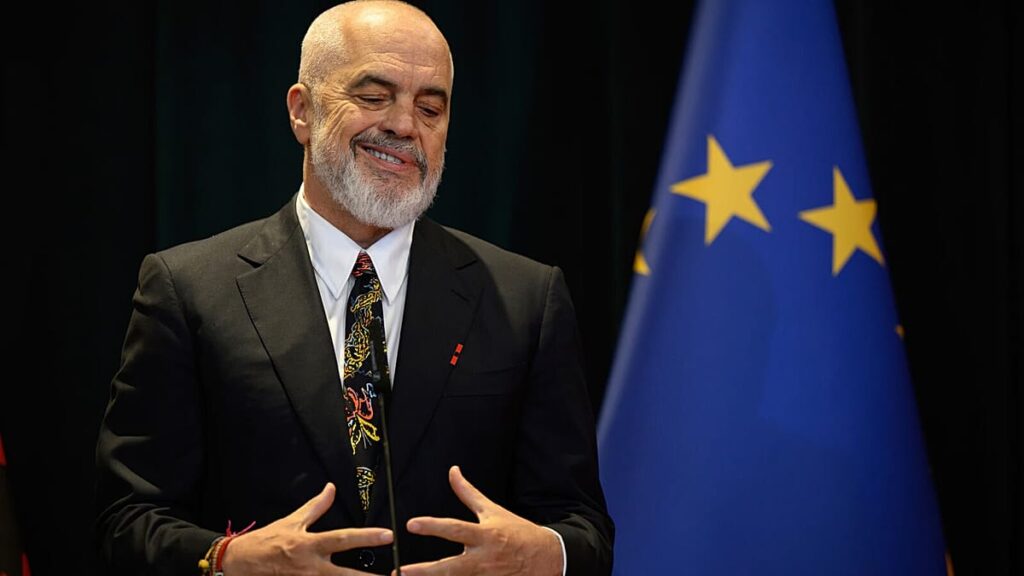Albanian Prime Minister Edi Rama believes he has found the secret recipe for bringing his country closer to the European Union faster: Artificial intelligence.
Facing a push for reforms to accelerate the country’s entry to the EU, Rama’s government is using AI-powered technology in the hopes of aligning Albanian laws with the EU quicker and more effectively. The move is embodied by an AI-generated avatar named ‘Diella’, who serves as a “virtual minister” tasked with improving public procurement and eliminating corruption. While the plan has gathered international attention for its audacious nature, it has also raised a host of questions.
Diella, whose name means ‘sun’ in Albanian, appears as a woman dressed in traditional Albanian attire and started government life as a chatbot helping Albanians navigate online government services. Rama, who secured a fourth consecutive term in May, argues she can make Albania “a country where public tenders are 100% free of corruption” and accelerate its accession to the EU.
Andreas Schieder, the European Parliament’s rapporteur on Albania, told Euronews the country is quickly progressing on its path to EU membership, including through digitalisation reforms, and could be in a position to close talks by the first half of 2027.
“Diella is about changing the perception of public administration and public procurement. It sends a strong signal to foreign investors, who are seeing a push for fairer and more accountable processes in Albania,“ Schieder told Euronews after returning from Albania on Friday, adding that Diella had been discussed “very intensely” during his talks on EU accession with Albanian representatives.
The Albanian government said Diella will be operated with human oversight. And for some, it could be a game-changer in how government bureaucracy is done.
“AI has been successfully tested by a number of international bodies to make procurement more transparent and test for any irregularities that could lead to corruption,” Andi Hoxhaj, a Balkan expert at King’s College London, told Euronews.
“This is also about sending a message: Albania is taking corruption very seriously and trying something new. If the old methods aren’t working, it’s time for new ones.”
Concerns over legitimacy, security and sovereignty
But a host of concerns over Diella have also emerged, with experts questioning her legitimacy and objectivity.
“An algorithm always includes biases,” Clotilde Bômont, Senior Policy Analyst for cyber and digital technologies at the European Union Institute for Security Studies (EUISS), told Euronews.
“The social, industrial, economic and scientific background in which an AI model is developed influences the algorithm and therefore has an impact on the outcomes.”
While not confirmed by the government, experts believe Diella is most likely based on US company OpenAI’s algorithm and hosted on Microsoft’s Azure cloud. Prime Minister Rama has a history of collaboration with Albanian-American tech executive Mira Murati, the former Chief Technology Officer of OpenAI and CEO of Thinking Machines Lab.
Facing US dominance in the digital space and China’s rapid expansion, the European Union is seeking to strengthen its own digital sovereignty by reducing its reliance on non-European actors and foreign companies, including AI and cloud computing systems.
The EU has also expressed concerned about the US government’s CLOUD Act, which could allow it to snoop on European data stored by American companies. A minister operating based on foreign AI models could be problematic, experts warn.
“Would this allow Microsoft or the US government to access the data? This is a big debate,” Clotilde Bômont explained.
“Even if the US provider manages to implement all possible technical safeguards, there will still be residual geopolitical and legal risks in the end, as two jurisdictions are effectively in competition here, the European and the American ones.”
The publicity Rama has gained with Diella could also lure hackers and cyber-attacks.
Albania taking anti-corruption reforms ‘seriously’
Despite the concerns, Rama has received international attention – and applause – for his audacious approach to bolster transparency, a key request from the EU.
“Of course I have criticism, and doubts,” said Andreas Schieder, a member of the European Parliament, “but the drive to fight corruption outweighs them.”
Public tenders have been at the center of corruption scandals in Albania in the past. Stamping out irregularities involving the public administration is one of Brussels’ core demands when to comes to Albania’s accession process to the EU.
The European Commission noted in its most recent report on the country’s application that “overall, corruption remains a serious concern,” adding that public procurement was one of the most “vulnerable sectors.”
The country has struggled to fix its international image, often connected to organised crime. Prime Minister Rama has denounced these as “outdated stereotypes.”
Following a sweeping judicial and constitutional reform in 2016, Rama’s administration introduced a special anti-corruption body known as SPAK to tackle corruption and organised crime at the highest level of government.
The agency has since become the country’s most trusted institution with more than half of Albanians saying they have confidence in the institution according to a Euronews Albania poll. Prior to its establishment, few cases of corruption were prosecuted due to bribery and political pressure.
Read the full article here


